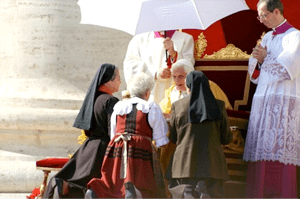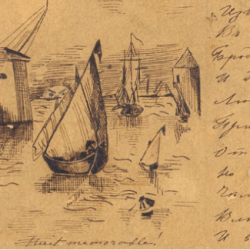By Tim Muldoon -- June 22, 2009
Photo by Rinaldo Cornacchini
 Imagine the pope speaking to a friend one day about the weather. "It's definitely going to rain," he says. But the day is sunny and beautiful, as are the next several. He's made an error in judgment, just like all of us do. So what about papal infallibility?
Imagine the pope speaking to a friend one day about the weather. "It's definitely going to rain," he says. But the day is sunny and beautiful, as are the next several. He's made an error in judgment, just like all of us do. So what about papal infallibility?
The short answer is that the pope usually isn't infallible, and this statement is consistent with Catholic teaching. Infallibility is a very precise set of conditions laid down by the First Vatican Council (1869-1870). In fact, the most solemn understanding of the pope's infallibility has been invoked by the Church only twice in its history, and both cases have to do with teachings about Mary.
But what even the misunderstanding about infallibility suggests is that people perceive the Catholic Church as holding a very strong understanding of authority, and this indeed is true. That understanding is rooted in Jesus' mission to the disciples to preach the Gospel to all nations, and in particular Jesus' mission to Peter to be the leader of the community of disciples.
So to put it broadly, authority in the Catholic Church reflects the importance placed on fidelity to the teachings of Jesus, exercised by the followers of the disciples (the bishops), those they call into service (priests and deacons), and those who participate in the Body of Christ through baptism (the faithful, sometimes referred to as the "laity").
Read more perspectives on authority in the Catholic Church in the Public Square.
1/1/2000 5:00:00 AM




